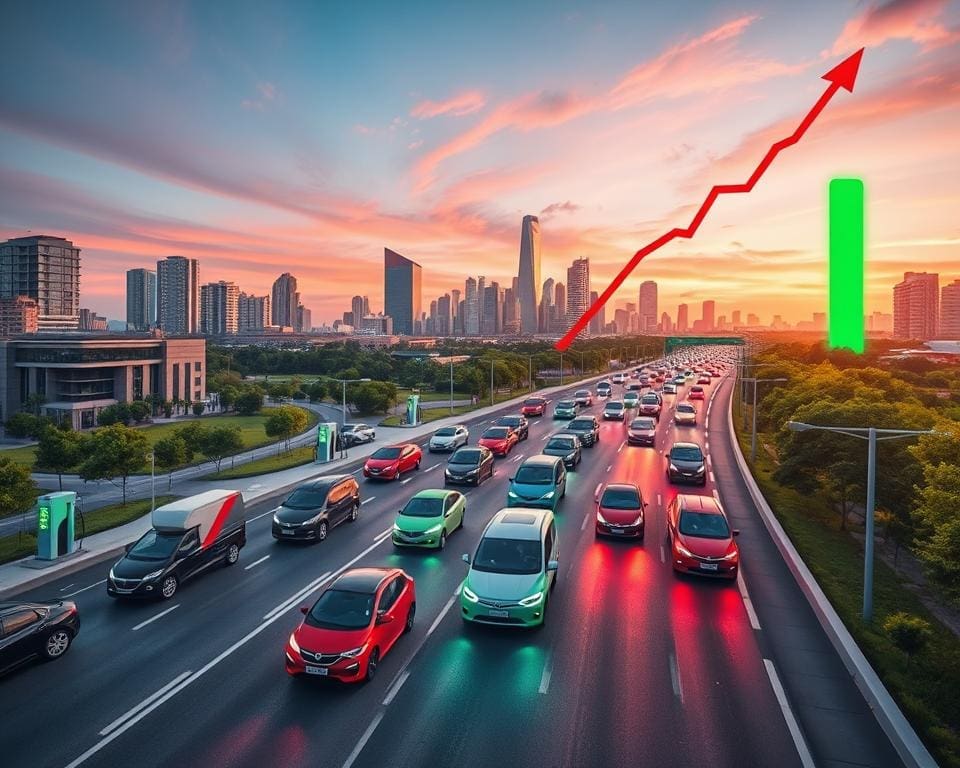The transformative role of electric vehicles (EVs) in our transport systems is paramount as we move towards a more sustainable future. How Electric Vehicles Are Shaping the Future of Transportation involves not just innovation but also a commitment to reducing emissions. With the automotive industry under heightened scrutiny for its carbon footprint, eco-friendly cars emerge as a viable solution. According to the International Energy Agency (IEA), electric vehicles play a crucial part in our battle against climate change and advancing greener alternatives.
The UK’s bold initiative to phase out petrol and diesel vehicles by 2030 highlights the nation’s dedication to embracing electric vehicle trends. Leading manufacturers such as Tesla, Nissan, and Volkswagen are pioneering this revolution, harnessing groundbreaking technology to amplify performance and efficiency, thereby reinforcing the significance of electric vehicles in shaping a cleaner future.
The Rise of Electric Vehicle Trends
As the landscape of the automotive sector changes rapidly, the rise of electric vehicle trends marks a significant transformation. This shift reflects evolving consumer preferences, alongside a growing awareness of environmental issues. The electric car market growth underlines a pivotal moment for the industry, as new strategies emerge to accommodate this burgeoning demand.
The Growth of the EV Market
The electric vehicle market has seen an unprecedented surge in recent years. Reports indicate a sharp rise in sales, with figures illustrating a growth exceeding 40% in 2021. Such impressive numbers are attributed to technological advancements, particularly in battery efficiency, which facilitate longer ranges and quicker charging times. The increasing accessibility of electric vehicles has piqued the interest of traditional car buyers, showcasing a clear trend in preferences towards more sustainable options.
Consumer Preferences and Behaviour
Consumer preferences have undergone a profound change, largely influenced by innovative marketing strategies and government incentives. Prospective buyers now recognise the long-term financial benefits of electric vehicles. As more individuals consider the environmental impact of their choices, electric vehicles position themselves as not just a luxury but a viable and smart investment. This transformation in consumer behaviour resonates deeply within the market, indicating a burgeoning acceptance of electric mobility.
Impact on Traditional Automotive Brands
The impact on traditional automotive industry players is significant. Established brands such as Ford, General Motors, and BMW are not only recognising the necessity to adapt but are investing heavily in electric vehicle development. This forward-thinking attitude is essential for maintaining competitiveness in a landscape marked by evolving consumer demands. As manufacturers innovate and transition to electric solutions, the influence of these consumer preferences will continue shaping their strategies moving forward.

How Electric Vehicles Are Shaping the Future of Transportation
The transformation of the transportation landscape is significantly influenced by innovations in electric vehicle (EV) technology. These technological advancements are not only reshaping consumer expectations but are also setting a new trajectory for the future of the automotive industry. From enhancements in battery storage capabilities to lightning-fast charging solutions, electric vehicles are becoming more user-friendly and accessible than ever. Leading companies such as Rivian and Lucid Motors exemplify this movement with their cutting-edge vehicles, which are equipped with features that prioritise safety and operational efficiency.
Innovations in EV Technology
At the heart of the progress in EV technology advancements lies the continuous improvement of battery performance and charging infrastructure. Enhanced battery efficiency allows for longer ranges, easing the concerns of potential buyers regarding range anxiety. Furthermore, rapid charging stations are proliferating across urban and rural landscapes, facilitating a smoother transition to electric mobility. This commitment to innovation within the EV sector plays a crucial role in encouraging widespread adoption among consumers, thus propelling the industry towards a sustainable future.
Sustainable Transportation Solutions for Urban Areas
Recognising the pressing need for sustainable transportation solutions, policymakers in the UK are prioritising initiatives that enable the growth of electric vehicles in urban settings. By implementing schemes that support the installation of public charging stations and promoting incentives for EV ownership, cities can effectively tackle issues of congestion and pollution. The collective efforts of governments, automotive manufacturers, and consumers are essential in establishing a green transportation ecosystem, paving the way for a cleaner and more sustainable future. As the collaboration between these entities intensifies, the vision of an environmentally friendly urban transportation landscape becomes increasingly attainable.








